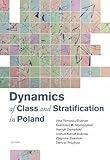Dynamics of class and stratification in Poland /Irina Tomescu-Dubrow [and five others.
Material type: TextPublication details: Budapest ; New York : Central European University Press, (c)2018.Description: 1 online resource (xvi, 296 pages)Content type:
TextPublication details: Budapest ; New York : Central European University Press, (c)2018.Description: 1 online resource (xvi, 296 pages)Content type: - text
- computer
- online resource
- 9789633861561
- 963386156X
- HN539 .D963 2018
- COPYRIGHT NOT covered - Click this link to request copyright permission: https://lib.ciu.edu/copyright-request-form
| Item type | Current library | Collection | Call number | URL | Status | Date due | Barcode | |
|---|---|---|---|---|---|---|---|---|
 Online Book (LOGIN USING YOUR MY CIU LOGIN AND PASSWORD)
Online Book (LOGIN USING YOUR MY CIU LOGIN AND PASSWORD)
|
G. Allen Fleece Library ONLINE | Non-fiction | HN539.5.6 (Browse shelf(Opens below)) | Link to resource | Available | on1048401590 |
Browsing G. Allen Fleece Library shelves, Shelving location: ONLINE, Collection: Non-fiction Close shelf browser (Hides shelf browser)
Includes bibliographies and index.
This book is about long-term changes to class and inequality in Poland. Drawing upon major social surveys, the team of authors from the Polish Academy of Sciences offer the rare comprehensive study of important changes to the social structure from the communist era to the present.0The core argument is that, even during extreme societal transformations, key features of social life have long-lasting, stratifying effects. The authors analyse the core issues of inequality research that best explain ?who gets what and why:? social mobility, status attainment and their mechanisms, with a focus on education, occupation, and income. The transition from communist political economy to liberal democracy and market capitalism offers a unique opportunity for scholars to understand how people move from one stratifi cation regime to the next.0There are valuable lessons to be learned from linking past to present. Classic issues of class, stratification, mobility, and attainment have endured decades of radical social change. These concepts remain valid even when society tries to eradicate them.
COPYRIGHT NOT covered - Click this link to request copyright permission:
There are no comments on this title.







